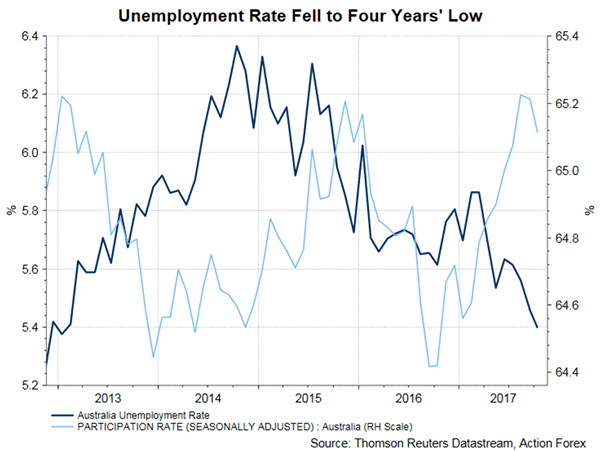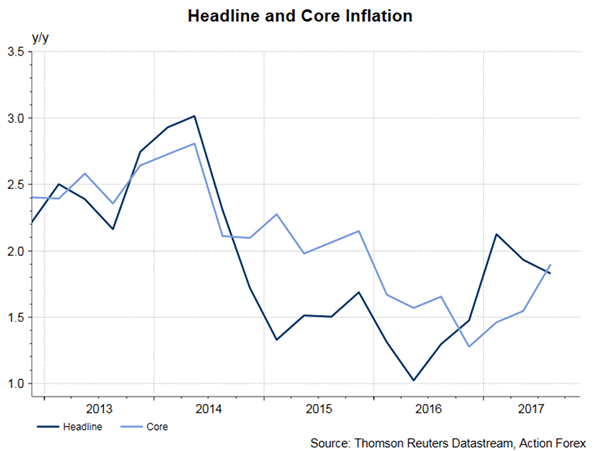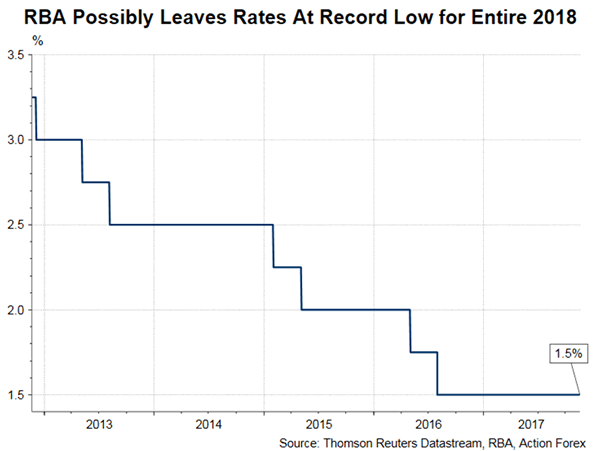The RBA minutes for the November minutes delivered a dovish tone as policymakers expressed concerns over the wage growth outlook. This is consistent with the central bank’s worry over household spending as indicated in the meeting statement (released earlier this month). We believe this has added further pressure to Aussie’s recent weakness, sending AUDUSD to the lowest level in 5 months. The central bank kept its powder, leaving the cash rate unchanged at 1.5%, in November. We expect the monetary policy would stay unchanged at least until 1H18 and could extend to 2H18.
Policymakers remained upbeat over the employment market, describing the conditions as ‘surprisingly strong over 2017’. The acknowledged that the broadly-based employment growth had been ‘running well above growth in the working-age population’ and had been driven by full-time employment over the past months. However, they showed particular concerns over the wage growth outlook, and its impacts on inflation. Policymakers acknowledged that wage growth had been ‘weaker than expected’ and had been ‘particularly low in the mining-related parts of the economy’. They noted that ‘the outlook for inflation would be influenced by the persistence of heightened competitive pressures, the outlook for wage growth and the speed with which wage costs might flow through to higher prices’. Yet, ‘there was considerable uncertainty around when and how quickly wage pressures might emerge and about how much these would add to inflationary pressure’. All in all, the members retained the view that inflation should increase, but ‘only gradually’.
RBA in the minutes also discussed the upcoming CPI reweighting which has caused a little downward revision on the inflation forecasts. The central bank stressed that this should not change RBA’s assessment of ‘how inflationary pressures were likely to evolve’. Comparing actual inflation and RBA’s forecasts, the central bank noted that ‘underlying inflation … been slightly higher than forecast, but the increase in headline inflation had been smaller than forecast’.
On the housing market, the central bank acknowledged that credit growth had ‘edged lower in recent months, as lending to owner-occupiers had eased and lending to investors had stabilized at a slower pace’. The minutes suggested that ‘the recent sharp declines in interest-only loan approvals suggested that banks had comfortably met the requirement set by the Australian Prudential Regulation Authority (APRA) for interest-only housing loans to comprise less than 30% of new housing lending’
The monetary policy stance was the same as previous months. As noted in the minutes, the Board ‘judged that holding the stance of monetary policy unchanged would be consistent with sustainable growth in the economy and achieving the inflation target over time’. While the language was the same ‘neutral’ stance as previous meetings, the central bank’s explicit concerns over wage growth and inflation outlook signal it would unlikely consider raising interest rates for the coming year.



